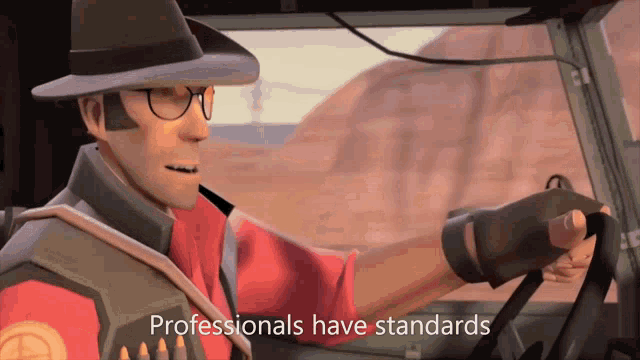Sorry for the delay. I promised
@Deceived3596 I would explain why I consider the calc to be an Outlier. To be upfront about it, I don't think that it fulfills
all of the requirements to be considered an
Outlier - but the page specifies anyway that a feat doesn't have to fulfill every single requirement to be considered one.
1) Is it a big jump or drop in power? If a character with several city destruction feats is shown to be able to destroy a mountain, we cannot necessarily consider it as an outlier, for the reason that the jump between tiers is not extreme enough to be so, despite the jump between energy values we attribute to them. If the character has very few feats, we can likely ignore this point.
Let's look at the example given in the reasoning for not necessarily considering a jump in power to be an Outlier.
It mentions a hypothetical character who could have several city desturction feats (let's assume that means 7-B) being shown to destroy a mountain (let's assume that means 7-A). The difference between the lowest end of
7-B (6.3 Megatons) and the highest end of
7-A (1000 Megatons) is around
158x.
The difference between the
6-B calc that Whitebeard scales to right now (12.53 Teratons) and the
5-C calc in the OP (33.6 Exatons) is around
2634214x or over 2.6 million times higher.
The example in the standards is also one tier jump within Tier 7, whereas the proposed upgrade here for Whitebeard is four tier jumps: 6-B --> High 6-B --> 6-A --> High 6-A --> 5-C.
The number of tiers isn't the only important consideration here as not all tiers are the same size. A look at the energy values themselves are a lot more information about just how much more powerful this would be than Whitebeard's typical level of power. There is no specific threshold for how much higher it would take for a feat to be considered a "big jump in power". We have to use our own judgement when it comes to this, and to me, this leap of the low end of 6-B to possibly 5-C counts as a big jump in power.
I'm
not automatically invalidating all jumps in power of this magnitude - context is important too, and characters going from one level of power to another extreme of power
is something that happens on the wiki for one reason or another. This is just one standard for it that has to be taken into consideration.
2) Is it a unique or exceptional incident? If incidents of a similar level are repeated consistently over time, they are unlikely to be outliers. Usually, from the third incident onwards. If the character has very few feats, we can also likely skip this point.
I think we can safely call this an "exceptional incident". If this was just a singular feat from Whitebeard displayed on-screen, then it would by definition be unique no matter how casually he did it, and fall below the threshold of "from the third incident onwards". But this is not the case; this is for a hypothetical feat that Whitebeard has never displayed. It is even rarer and exceptional than if Whitebeard had done it once on-screen.
As for the actual feats with the Gura Gura no Mi that the characters have done, we have a High 6-C calc, a Low 6-B+ calc, and two 6-B calcs.
The Gura Gura no Mi is not "featless" without this hypothetical world-shaking feat. And those are just the ones we've got calcs of; we've seen Whitebeard and Blackbeard use their devil fruit in combat more than just that.
It is being excused that Whitebeard never
needed to use the fruit to this level of potential - but even if that were the case, that wouldn't change the fact that in terms of demonstrated feats, the proposal is quite exceptional compared to what we've actually seen.
3) Is the event unexplained and unjustified? If an extreme incident is not accompanied by any kind of explanation that justifies it, it is probably an outlier. But if it can be explained by means of some power-up, vulnerability, or limiter, it is likely not. If Superman is wounded by a bullet, it's probably an outlier. But if Superman was under the influence of red sunlight or was previously weakened with Kryptonite, it is not.
The "feat" of shaking the world is explained as Kachon said, but certain liberties have to be taken in our assumptions for it.
The proposed method is that Whitebeard will shake the entire world, creating a simultaneous Magnitude 6 earthquake around the entire planet at once.
The reasoning being that Whitebeard could possibly cause global-level devastation everywhere and a Magnitude 6 earthquake is the minimum needed to cause some devastation.
Depending on interpretation, I can see how this point can be seen as the feat being justified so I won't contest it but the only form of explanation for Whitebeard holding back his power is when
Sengoku said that Whitebeard will do everything he can to sink Marineford now that Ace has been rescued. However after Ace dies, Whitebeard continues fighting top-tier fighters for some time and doesn't exhibit massively increased power compared to what he showed earlier in the battle.
4) Does the event break the previously established power-scaling? Here we must take into account a number of factors, such as comparable characters possessing feats or statements of a similar level to the hypothetical outlier, the outlier not being supported by fights that might suggest a similar level, or subsequent events or statements that contradict it in some way.
I think I'm safe in saying that this does break the previously established power-scaling.
Comparable characters to Whitebeard do not possess feats or statements on the level of possibly 5-C. Nowhere close in fact.
5) Does the event break with the narrative of the work? Many times an outlier breaks with what has been previously established or shown in a work, creating inconsistencies that are difficult to resolve unless we invalidate one of the two events. If, for example, a character claims not to be able to dodge bullets, even though he was previously seen dodging them explicitly, we are faced with a contradiction where we will probably have to resort to using the more reliable evidence.
This part seems a bit difficult as both the "narrative" and the "event" appear to be the same thing here. It is being argued that Whitebeard
should be able to do this and therefore because he
should be able to do it, that makes it not be an Outlier.
If you take the narrative to be "Whitebeard can create a global Magnitude 6 earthquake" then of course a calc for a global Magnitude 6 earthquake would not contradict that narrative.
Personally I'm not convinced that Whitebeard can actually do the feat in the first place that is being calced - when I voted for a Possibly on the range, I never specified that this meant I believe that Whitebeard is capable of shaking the entire planet at once. But I can understand if others think that this requirement isn't fulfilled by the feat so I won't contest this part.
My own conclusion of the matter is that "possibly 5-C" Whitebeard is an
exceptional feat (2), which is a
big jump in power (1) that
breaks the previously established powerscaling (4). I don't think the feat is enitirely unjustified and I don't think it necessarily breaks the narrative of the series depending on what you believe the narrative to be, but I don't think that outweights the other three standards and i'm not convinced that this is what needs to be added to the profiles.
Because a ruling based on our Outlier standards requires us to interpret how the proposal lines up with each standard, I can understand someone coming to a different conclusion on this like That_Moron and Kachon both have, but this is why I see it as an outlier for now.


